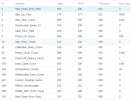Hi,
Happy to finally have got PBS and PVE working together, I immediately found that I get an error when trying to backup...
The log contained this... Does not look very good...
But when I run S.M.A.R.T. tests on the NAS itself it does not seem bad at all, infact, it is very happy. What...?

What else can I check? I've heard about misaligned drives, but would be surprised. This has been installed and working like this before...
Edit: Running an extended S.M.A.R.T too now. Thinking if a simple format of them would do any good...? Just read about internal disk cables gone bad, will try that next.
Thanks
Happy to finally have got PBS and PVE working together, I immediately found that I get an error when trying to backup...
Code:
INFO: resuming VM again
INFO: scsi0: dirty-bitmap status: existing bitmap was invalid and has been cleared
INFO: 1% (524.0 MiB of 32.0 GiB) in 3s, read: 174.7 MiB/s, write: 136.0 MiB/s
INFO: 2% (924.0 MiB of 32.0 GiB) in 6s, read: 133.3 MiB/s, write: 101.3 MiB/s
INFO: 4% (1.4 GiB of 32.0 GiB) in 9s, read: 186.7 MiB/s, write: 80.0 MiB/s
INFO: 6% (2.0 GiB of 32.0 GiB) in 12s, read: 172.0 MiB/s, write: 142.7 MiB/s
INFO: 7% (2.3 GiB of 32.0 GiB) in 15s, read: 118.7 MiB/s, write: 118.7 MiB/s
INFO: 7% (2.5 GiB of 32.0 GiB) in 17s, read: 86.0 MiB/s, write: 86.0 MiB/s
ERROR: job failed with err -5 - Input/output error
INFO: aborting backup job
INFO: resuming VM againThe log contained this... Does not look very good...
Code:
Apr 20 17:18:05 pve pvedaemon[9730]: INFO: starting new backup job: vzdump 102 --remove 0 --node pve --storage PBS --mode snapshot --notes-template '{{guestname}}'
Apr 20 17:18:05 pve pvedaemon[9730]: INFO: Starting Backup of VM 102 (qemu)
Apr 20 17:18:23 pve kernel: ata1.00: exception Emask 0x0 SAct 0xffffffff SErr 0x40000 action 0x0
Apr 20 17:18:23 pve kernel: ata1.00: irq_stat 0x40000008
Apr 20 17:18:23 pve kernel: ata1: SError: { CommWake }
Apr 20 17:18:23 pve kernel: ata1.00: failed command: READ FPDMA QUEUED
Apr 20 17:18:23 pve kernel: ata1.00: cmd 60/80:58:00:84:0a/01:00:1b:00:00/40 tag 11 ncq dma 196608 in res 41/40:80:30:84:0a/00:01:1b:00:00/00 Emask 0x409 (media error) <F>
Apr 20 17:18:23 pve kernel: ata1.00: status: { DRDY ERR }
Apr 20 17:18:23 pve kernel: ata1.00: error: { UNC }
Apr 20 17:18:23 pve kernel: ata1.00: supports DRM functions and may not be fully accessible
Apr 20 17:18:23 pve kernel: ata1.00: supports DRM functions and may not be fully accessible
Apr 20 17:18:23 pve kernel: ata1.00: configured for UDMA/133
Apr 20 17:18:23 pve kernel: sd 0:0:0:0: [sda] tag#11 FAILED Result: hostbyte=DID_OK driverbyte=DRIVER_OK cmd_age=0s
Apr 20 17:18:23 pve kernel: sd 0:0:0:0: [sda] tag#11 Sense Key : Medium Error [current]
Apr 20 17:18:23 pve kernel: sd 0:0:0:0: [sda] tag#11 Add. Sense: Unrecovered read error - auto reallocate failed
Apr 20 17:18:23 pve kernel: sd 0:0:0:0: [sda] tag#11 CDB: Read(10) 28 00 1b 0a 84 00 00 01 80 00
Apr 20 17:18:23 pve kernel: blk_update_request: I/O error, dev sda, sector 453674032 op 0x0:(READ) flags 0x0 phys_seg 21 prio class 0
Apr 20 17:18:23 pve kernel: ata1: EH complete
Apr 20 17:18:23 pve kernel: ata1.00: Enabling discard_zeroes_data
Apr 20 17:18:24 pve pvedaemon[9730]: ERROR: Backup of VM 102 failed - job failed with err -5 - Input/output error
Apr 20 17:18:24 pve pvedaemon[9730]: INFO: Backup job finished with errors
Apr 20 17:18:24 pve pvedaemon[9730]: job errors
Apr 20 17:18:24 pve pvedaemon[971]: <root@pam> end task UPID:pve:00002602:0004C30C:644157AD:vzdump:102:root@pam: job errorsBut when I run S.M.A.R.T. tests on the NAS itself it does not seem bad at all, infact, it is very happy. What...?

What else can I check? I've heard about misaligned drives, but would be surprised. This has been installed and working like this before...
Edit: Running an extended S.M.A.R.T too now. Thinking if a simple format of them would do any good...? Just read about internal disk cables gone bad, will try that next.
Thanks
Last edited:

